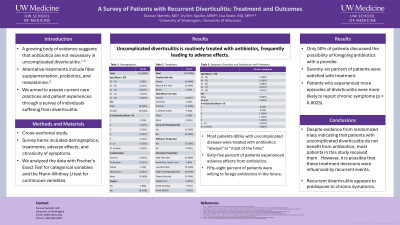Sunday Poster Session
Category: Colon
P0230 - A Survey of Patients With Recurrent Diverticulitis: Treatment and Outcomes
Sunday, October 27, 2024
3:30 PM - 7:00 PM ET
Location: Exhibit Hall E

Has Audio

Duncan T. Skerrett, BA
University of Washington School of Medicine
Seattle, WA
Presenting Author(s)
Duncan T. Skerrett, BA1, Lisa Strate, MD2, Ivy Kim-Aguilar, ARNP3
1University of Washington School of Medicine, Seattle, WA; 2University of Washington, Seattle, WA; 3Pulse Heart Institute, Tacoma, WA
Introduction: The management of acute, uncomplicated diverticulitis involves multiple specialties including gastroenterology, primary care, emergency medicine, and surgery. Guidelines have changed to include the option to treat without antibiotics. We aimed to evaluate diverticulitis care practices, burden of symptoms, and patient experiences.
Methods: We administered an anonymous, IRB approved, 25-item REDCap survey via email to patients referred to gastroenterology clinic at an urban safety net hospital for management of diverticulitis. The survey assessed demographics, number and frequency of episodes, history of complications, symptoms, and treatment recommendations. We used Fisher’s Exact Test for categorical variables and the Mann-Whitney U test for ordinal variables.
Results: The study population (n=26), which was 62% female and had a mean age of 59, experienced an average of 9 episodes of diverticulitis. Of these patients, 58% had ≥ 5 episodes, 54% suffered complications, and 8% required surgery. During symptomatic episodes, 92% of patients reported treatment with antibiotics “always” or “most of the time,” while 8% were treated with antibiotics “rarely.” Patients who were more frequently diagnosed by healthcare providers received antibiotics more often (p = 0.018). Many patients (92%) experienced adverse effects from antibiotics, including diarrhea (42%), nausea (31%), vomiting (8%), and C. difficile colitis (8%). Fifty percent of patients discussed holding antibiotics for future episodes with their provider and 58% were interested in foregoing future antibiotic treatment. Most patients (92%) received lifestyle counseling to prevent recurrence, including high fiber diet (88%), regular physical activity (58%), and limitation of red meat (58%). Fifty percent of patients experienced chronic symptoms, including abdominal pain (50%), bloating (23%), diarrhea (23%), constipation (15%), nausea (15%), fever (4%), and fatigue (4%). Patients who experienced more episodes of diverticulitis were more likely to report chronic symptoms (p = 0.0025).
Discussion: Patients with recurrent diverticulitis were frequently treated with antibiotics, regardless of the specialty of the treating provider, and often experienced adverse effects of treatment. Most patients were interested in foregoing antibiotics for future symptomatic episodes. Patients who suffered more episodes of diverticulitis were more likely to experience chronic symptoms.
Note: The table for this abstract can be viewed in the ePoster Gallery section of the ACG 2024 ePoster Site or in The American Journal of Gastroenterology's abstract supplement issue, both of which will be available starting October 27, 2024.
Disclosures:
Duncan T. Skerrett, BA1, Lisa Strate, MD2, Ivy Kim-Aguilar, ARNP3. P0230 - A Survey of Patients With Recurrent Diverticulitis: Treatment and Outcomes, ACG 2024 Annual Scientific Meeting Abstracts. Philadelphia, PA: American College of Gastroenterology.
1University of Washington School of Medicine, Seattle, WA; 2University of Washington, Seattle, WA; 3Pulse Heart Institute, Tacoma, WA
Introduction: The management of acute, uncomplicated diverticulitis involves multiple specialties including gastroenterology, primary care, emergency medicine, and surgery. Guidelines have changed to include the option to treat without antibiotics. We aimed to evaluate diverticulitis care practices, burden of symptoms, and patient experiences.
Methods: We administered an anonymous, IRB approved, 25-item REDCap survey via email to patients referred to gastroenterology clinic at an urban safety net hospital for management of diverticulitis. The survey assessed demographics, number and frequency of episodes, history of complications, symptoms, and treatment recommendations. We used Fisher’s Exact Test for categorical variables and the Mann-Whitney U test for ordinal variables.
Results: The study population (n=26), which was 62% female and had a mean age of 59, experienced an average of 9 episodes of diverticulitis. Of these patients, 58% had ≥ 5 episodes, 54% suffered complications, and 8% required surgery. During symptomatic episodes, 92% of patients reported treatment with antibiotics “always” or “most of the time,” while 8% were treated with antibiotics “rarely.” Patients who were more frequently diagnosed by healthcare providers received antibiotics more often (p = 0.018). Many patients (92%) experienced adverse effects from antibiotics, including diarrhea (42%), nausea (31%), vomiting (8%), and C. difficile colitis (8%). Fifty percent of patients discussed holding antibiotics for future episodes with their provider and 58% were interested in foregoing future antibiotic treatment. Most patients (92%) received lifestyle counseling to prevent recurrence, including high fiber diet (88%), regular physical activity (58%), and limitation of red meat (58%). Fifty percent of patients experienced chronic symptoms, including abdominal pain (50%), bloating (23%), diarrhea (23%), constipation (15%), nausea (15%), fever (4%), and fatigue (4%). Patients who experienced more episodes of diverticulitis were more likely to report chronic symptoms (p = 0.0025).
Discussion: Patients with recurrent diverticulitis were frequently treated with antibiotics, regardless of the specialty of the treating provider, and often experienced adverse effects of treatment. Most patients were interested in foregoing antibiotics for future symptomatic episodes. Patients who suffered more episodes of diverticulitis were more likely to experience chronic symptoms.
Note: The table for this abstract can be viewed in the ePoster Gallery section of the ACG 2024 ePoster Site or in The American Journal of Gastroenterology's abstract supplement issue, both of which will be available starting October 27, 2024.
Disclosures:
Duncan Skerrett indicated no relevant financial relationships.
Lisa Strate: Medtronic – Advisory Committee/Board Member.
Ivy Kim-Aguilar indicated no relevant financial relationships.
Duncan T. Skerrett, BA1, Lisa Strate, MD2, Ivy Kim-Aguilar, ARNP3. P0230 - A Survey of Patients With Recurrent Diverticulitis: Treatment and Outcomes, ACG 2024 Annual Scientific Meeting Abstracts. Philadelphia, PA: American College of Gastroenterology.
